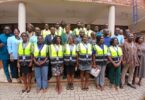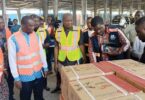Report By: Ishmael Barfi
In pursuit of more inclusion of women in the mining sector, the Minister for Lands and Natural Resources, Hon. Samuel A. Jinapor, has pledged the government’s unwavering commitment to partnering with Women in Mining (WIM) Ghana and stakeholders across the industry.
This commitment the Sector Minister said was to drive meaningful changes for a more inclusive and prosperous mining sector that is fit for purpose.
Addressing the theme of Diversity, Inclusion, and Belonging: Actions for the Mining Sector the Maiden National Policy Dialogue organized by Women in Mining Ghana, in Accra on Thursday, 21st March 2024, Hon. Jinapor acknowledged the importance of investing in women’s empowerment, aligning with the recent International Women’s Day celebrations.
He further emphasized the government’s vision to position Ghana as the primary hub of Africa’s mining activities.

Lands Minister in a group picture leadership of Women in Mining
The National Policy Dialogue brought together stakeholders in the mining industry to discuss the findings of two research studies on the theme conducted by WIM with prominence on developing proposals that would be directed into formulating gender-sensitive policy for the mining sector.
For the realization of the above, the Lands and Natural Resources, Samuel Abu Jinapor, advised women in the mining industry to maximize the training opportunities available to build their capacities for occupying crucial decision-making positions.
This he noted is important to create opportunities for women to participate in all aspects of the industry, especially in the ranks of administration, from entry-level positions to leadership roles, the Minister said, and highlighted training and education support in fields, such as geology and chemical engineering.

Dignitaries on the high table
Meanwhile, the Sector Minister stressed the significance of inclusivity and justice in broadening participation in the industry, applauding Women in Mining Ghana for its advocacy efforts and commitment to core industry values.
Touching on the substantial contribution of women to the mining sector, Hon. Jinapor cited examples of local content initiatives such as catering services, which generate significant revenue, as much as 2 million dollars and over.
All these he noted contribute immensely to the country’s socio-economic development.
“So I charge the Women in Mining to pay particular attention to training because Part of inclusion is training and educating the women to become part of the process from the very beginning.

Cross Section of audience at the National Policy Dialogue
Taking relevant programs that will make them qualified from the word go so that there is no reason not to include them”, he reiterated.
Expressing determination to align government policies with the needs of women in mining, Hon. Jinapor called for collaborative efforts to enhance inclusivity and promote women’s success in the sector.
“There is the need to come together to put policies and practices that promote gender equality, creating opportunities for women to advance in their careers, and fostering a culture of respect and inclusivity within mining companies”. He added.
Therefore he reaffirmed the Ministry’s commitment to fostering an environment conducive to women’s advancement, echoing the sentiment that when women succeed, the nation prospers.

President of Women in Mining, (WIM) Ghana, Mrs. Georgette Barnes Sakyi-Addo
On her part, the President of Women in Mining, (WIM) Ghana, Mrs. Georgette Barnes Sakyi-Addo explained that the policy dialogue is not just to acknowledge the realities and challenges faced by women in the mining sector, but to focus on actionable solutions.
She further cited access to information, financial resources, and inadequate policies to support active involvement as some of the challenges identified.
She therefore urged and called on all stakeholders and participants to take the agenda of diversity, inclusion, and belonging forward, not just within borders but to the broader African Union and ECOWAS.
“Let us make this a collective effort, a united stand for a more Inclusive and prosperous mining sector”, Mrs. Georgette Barnes Sakyi-Addo concluded.
There were also Solidarity messages given by other Presidents of Women in Mining Africa from Congo, Nigeria, Namibia and Niger.
Source: www.thenewindependentonline.com








